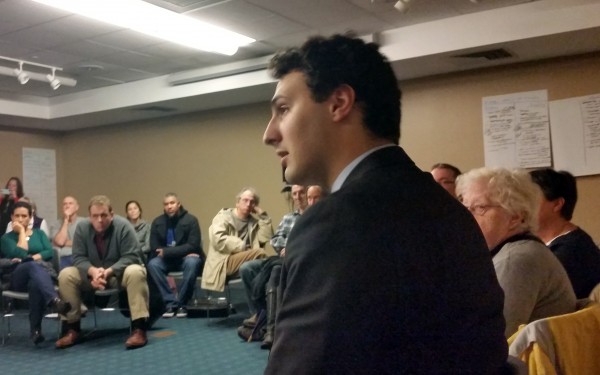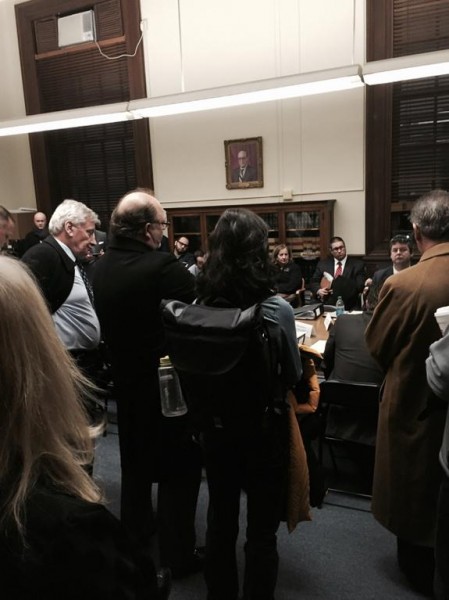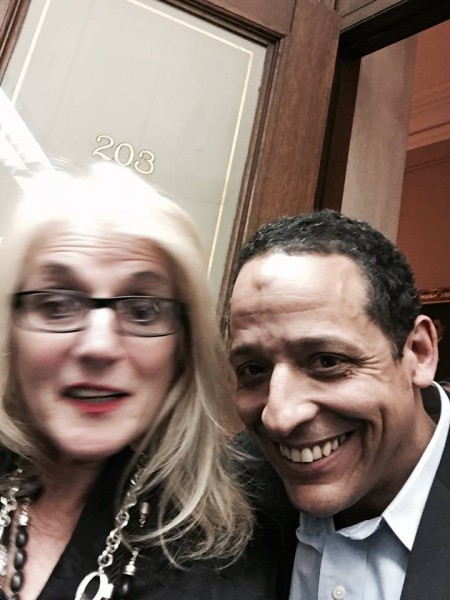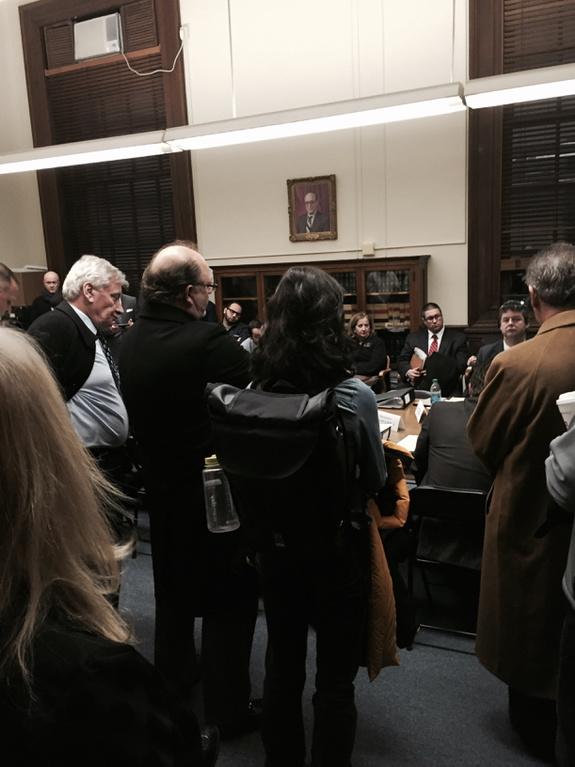
House Bill 5363 which attempts to curb tip theft in the service industry and give employees additional power to combat the practice, was introduced by Representative Aaron Regunberg this year. It is identical to the one introduced the last two years by Rep Chris Blazejewski with the big difference being that public awareness of the pervasiveness of tip and wage theft is growing due to some serious studies released recently (along with the efforts of the Fight for $15 movement) and the addition of a new player here in Rhode Island as Mike Araujo takes the helm of a new local branch of the Restaurant Opportunity Center, ROC United RI.
“Tip theft is a practice in which employers or managers appropriate some of the money left as tips for restaurant, hotel or other service workers,” Regunberg explained.
It primarily occurs, he said, in four different ways:

1. Employers can demand a cut of tips from workers
2. Employers can absorb automatic service fees who you might think would go to those workers that provided the service,
3. Employers can charge workers if customers use credit cards
4. Employers can include themselves in the tip pool and then take a cut of that pool.
“For me there’s a few different angles to this issue,” said Regunberg, “Besides being a workers protection issue, I really believe it’s fundamentally a consumers rights issue as well. If I am eating at a restaurant or staying at a hotel, and I leave a ten dollar tip, I assume the entire ten dollars is joined to the workers who did the work that I paid the tip for. I think that’s a reasonable assumption, one that’s shared by the vast majority of customers.”
Chris Tarro, owner of Siena Restaurant Group, sidestepped the issue as to whether or not customers are being duped when restaurants take part of a tip or the entirety of a service charge, saying, “Every employee in my facility knows, when they get hired, that I deduct the credit card fee on their gratuity only.”
Mike Araujo of ROC United RI, countered that, “To say that the credit card fee or the commission that’s paid is on the gratuity alone is kind of a misnomer. The fact is that a tip is a wage. It’s making up the difference in a wage that’s already too low, so anything that comes out of that wage is directly coming out of the pocket of that employee.”
Joey DeFrancesco, who became an Internet sensation with his video “Joey Quits” in 2011, explained one way in which the present process works against the employee actually providing the service.
“I worked at the Providence Renaissance Hotel… this is a pretty fancy place… I worked in room service and we made about $5.50 an hour, so below minimum wage. On top of that we got service charges in the hotel. Each bill going to room service got a 20 percent service charge. the customer sees that bill, assumes that’s a tip, and is not going to tip you. You’re not going to be impolite and say, ‘Actually, you know, we’re not getting that,’ you know, that’s against the rules.
“What was actually happening is the hotel was taking that 20 percent service charge and then our managers, supervisors who were making more than twice as much as us per hour, were taking half of that. So at the end of the day the servers actually conducting the work were making less than half of the tip money that customers believed they were giving to those servers.”
Joseph Fortune worked at Ruth’s Chris Steak House in downtown Providence during the entirety of it’s being open.
“If it was a booked banquet, I would still be making $2.89 an hour. The tip would look like a 20 percent tip going to the waitstaff, but really 17 percent went to the waitstaff and the other 3 percent was administrative for the managers. And pretty much, the customers never knew that… I would be fired if I told them, ‘Look, that 3 percent isn’t going to me.’”

The restaurant owners in attendance, mostly members of the Rhode Island Hospitality Association (RIHA), disagreed with the way the issue was being framed, and disagreed on the basic definition of certain terms, like service charge, gratuity and management. Kristin Gennuso, of Chez Pascal, explained why she thinks there’s a difference between a tip and a service charge.
“They are not considered to be the same thing by the IRS,” said Gennuso, “A tip is money that is left by a consumer. It is left free of will. A service charge is imposed, put on by the establishment. Sometimes you’ll see that for parties of six or more there will be a 20 percent gratuity, excuse me, service charge.”
“When you add a service charge to someone’s bill, you the consumer has to pay an 8 percent tax on that service charge. Then I take that service charge, I have to put that in as a sale… and then I can distribute it to my employees through payroll where the taxes can be taken out. So it’s consider a sale, that raises my sales liability, I have to put it into my payroll, which raises my payroll, and my worker’s compensation liability, and then I can distribute it out as I see fit because it’s an item on a check.”
“So, if it says a service charge, it’s not a tip. They’re two very different things.”
House Labor Committee vice-chair Rep Thomas Palangio pointed out that when a customer sees a service charge on a bill, they are going to assume that it’s for the server, to which Gennuso replied, “That’s a problem with the language, isn’t it?”
When Palangio pressed that people won’t tip as much, because they assume it’s taken care of in the service charge, Gennuso countered, “But it’s not the fault of the employer, however.”
Restaurant owners had other complaints as well. Chris Tarro explained that he has “140 employees, and I love my employees. I love ‘em. So when I hear the word ‘fraud,’ or ‘steal,’ or ‘take advantage,’ I get pissed off. I love my staff. When it snows and we have a bad day, I care more about them than about me. I’m getting choked up because I care about them, and I don’t know a restaurant owner that doesn’t.
“This is the industry I love, and this is one of the only thriving industries in the state, and we’re being attacked.
“This bill- I get the intent of this bill- we shouldn’t steal from our staff. I absolutely agree that this is a worthwhile goal but this bill isn’t the way to accomplish it.”
This prompted Jaimie, a restaurant worker in support of this bill, to counter, “If [Taro] really loves his employees and wants to protect them, there’s no reason there should be any opposition to this bill.”
“This legislation,” says Representative Regunberg, “is not punishing businesses. It doesn’t add an additional tax onto business owners. What it does is ensure that workers, many of whom are low wage workers relying on those tips, receive the gratuities that they worked for, and customers’ money goes where it was intended to go.”
But Chris Tarro thinks the bill does impose a cost, saying, “This bill avoids the Rhode Island Department of Labor and Training (DLT) and goes to Superior Court. We have a DLT to handle this, but the bill would move these cases to the much more costly superior court.” (Though unsurprisingly, I have never heard of a business owner who would willingly forgo Superior Court in the case of an employee caught stealing from them.)
Bill Kitsilis, an attorney as well as the owner of Angelo’s Pizza Palace, complained that “what scares me about this bill is that it’s a pro-plaintiffs bill. There’s a lot of propaganda to say it’s protecting employees, it’s tip theft and wage theft, but what this is is an administrative nightmare for especially pizza restaurants, the counter service, coffee shops, you name it.”
“This bill says that you can only share the tips in proportion to the work done by the service employees. What does that mean? On a Friday night at Angelo’s Pizza I have two people working the counter up front, two cashiers in the back answering phones but they’re not doing the same exact work. There’s one tip jar up in the front and they all share it equally. We’ve been doing it this way for thirty years without a problem.”
“What happens here, when you have a law that brings you right to Superior Court, it absconds, because you don’t go to the Department of Labor anymore, and it makes you pay if you lose, even a little bit. Trying to defend what proportionality means and sharing of tips? Who a manager really is and who a manager isn’t?”
“Put this in the hands of a plaintiffs attorney where they get to go to court and they’re entitled to attorney’s fees and triple the damages if they just win a little bit? or put a gun to an owner’s head where you’re forced to settle. No offense to any attorneys on this board.”
This prompted Rep. Joe Shekarchi, the chairman, to distance himself from the legislation, laughing, “I can assure you that none of us drafted this bill.”

Bob Bacon, head of the Rhode Island Hospitality Association and owner of Gregg’s Restaurants argued that, “A state law on this would be redundant to the federal law. The federal law is very thorough. It’s very well enforced…”
Joey DeFrancisco disagreed with Bacon’s assessment. “I thought federal law would cover [the tip theft I experienced at the Renaissance Hotel Providence], so I went to the Department of Labor… and I said, ‘This is crazy that this is going on, can you guys investigate?’ This was in 2011. They did so, they looked into the issue, they interviewed managers and workers they got back to me and said, ‘Okay, in fact, they are stealing your tips, however because they are not stealing enough of your tips that it’s putting you below minimum wage, there’s actually nothing the federal Department of Labor can do about this.”
Remember that there are many different ways in which tips may be stolen by management. So sometimes, when the fines are big enough and the case is against a high profile target, the US Department of Labor does step in. “Mario Batali was fined $5 million” for wage theft, points out Chris Tarro.
“The federal laws are simply not sufficient,” concludes DeFrancisco. “They do not cover tip theft in the forms we’re talking about, which is why so many states… have passed bills like this.”
In fact, according to Regunberg, “Rhode Island is significantly behind the eight ball on this issue. By my count there’s at least 23 other states that have state legislation banning some or all forms of tip theft, including most of our neighbors. New Hampshire, New York, Maine, Massachusetts, Vermont, etc.”
“If you pass this bill and servers cost more,” warns Chris Taro, “the people that might get hurt are the people who are already the lowest paid in the industry. The cooks. The dishwashers. The cleaning guys.
“I want my servers to make more money,” continues Tarro, “This isn’t the bill to do it. Let’s work together promoting this industry. Let’s educate the people who are breaking the law and penalize them. Let’s get together and spend more money on tourism because our state is pitiful and behind. I do more business, they make more money. Simple as that.”
But to argue that laws meant to protect low wage workers hurts the restaurant industry ignores the fact, says Mike Araujo of ROC United RI, that, “the people who serve are part of the industry.”
He said, “The average tipped worker does not make $20 an hour. We are not all high end restaurants. We are mostly Denny’s, we are mostly diner service. So to say that ‘my people do well’ or ‘I love my people’ might be true, but we have to love all the people who work in the industry.”
Bob Bacon made a counter offer that would involve no intervention from government. “…as chairman of [RIHA] last year and as a member of the board the year before, and I’ll reiterate this year again, if one of these people that says they have all these problems, if they want to come to us, I’ve offered for three years in a row to do the following: First, we’ll keep the employees name confidential. Second, we’ll meet with the employer and we’ll bring the complaint to their attention, third, we’ll work to educate that employer on the U.S. Department of Labor’s rules and regulations on the matter, and fourth, probably most important, in the event that an employer chooses to stay out of compliance with an issue, we would assist the employee in going through the appropriate channels to get the situation rectified.”
It doesn’t seem to have occurred to Bacon that the idea of an employee, going to a consortium of power players in the restaurant and service industry here in Rhode Island to make a complaint with no guarantee of legal protection of the kind granted by the government, might be seen as career suicide. The idea that wage theft can be dealt with by the very industry committing the violations is absurd.
“…the majority of the people in this industry, they object to the people who may violate [laws against wage and tip theft],” says Bacon, “Thirty-five years plus in the industry, I’ve never encountered it, but I’m not naive enough to say that it doesn’t exist. I can tell you that it doesn’t exist on the level that’s being portrayed here tonight. I can say that without any reservation.”
Back in reality, Rep Regunberg said, “In order for us to have a productive dialog and come to a solution that optimal for all parties, we first have to take as valid that this is a real issue. This is a practice that happens, and I’m by no means implying that all employers engage in tip theft, but I can almost guarantee you that if you talk with nearly any service worker, they can clarify that this is something that takes place and not as an isolated incident. This is something that can occur regularly, that places a real burden on Rhode Islanders who are working hard and are relying on tips to make ends meet.”
Mike Araujo was more pointed. “The fact is that the people who work for tips in Rhode Island use public assistance at a rate twice that of any other employee. Of the 20,000 people who work for tips in Rhode Island we’re talking about 10,000 who are on assistance. Clearly, every penny counts to these people.
“The cost of public assistance, just in food assistance to tipped workers in Rhode Island, amounts to $700,000 per month,” continues Araujo, “It’s vital that this passes. This is an issue of poverty, this is an issue of equality, and this is the right thing to do.”




